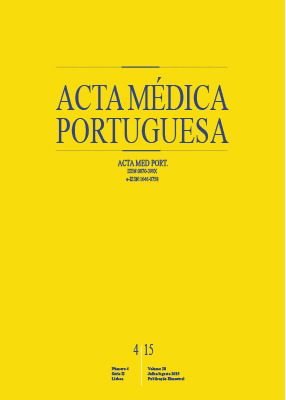Effects of Acute Sleep Deprivation Resulting from Night Shift Work on Young Doctors
DOI:
https://doi.org/10.20344/amp.5777Keywords:
Circadian Rhythm, Physicians, Sleep Deprivation, Sleep Disorders, Work Schedule Tolerance.Abstract
Introduction: To evaluate sleep deprivation and its effects on young physicians in relation to concentration capacity and psychomotor performance.
Material and Methods: Eighteen physicians aged 26 - 33 years were divided into 2 groups: non-sleep deprived group (with no night work) and sleep deprived group (minimum 12 hour of night work/week). We applied Pittsburgh Sleep Quality Index to screen the presence of sleep pathology and Epworth Sleepiness Scale to evaluate subjective daytime sleepiness; we used actigraphy and sleep diary to assess sleep hygiene and standard sleep-wake cycles. To demonstrate the effects of sleep deprivation, we applied Toulouse-Piéron’s test (concentration test) and a battery of three reaction time tasks after the night duty.
Results: Sleep deprived group had higher daytime sleepiness on Epworth Sleepiness Scale (p < 0.05) and during week sleep
deprivation was higher (p < 0.010). The mean duration of sleep during the period of night duty was 184.2 minutes to sleep deprived group and 397.7 minutes to non-sleep deprived group (p < 0.001). In the Toulouse-Piéron´s test, the sleep deprived group had more omissions (p < 0.05) with a poorer result in concentration (p < 0.05). Psychomotor tests that evaluated response to simple stimuli revealed longer response latency (p < 0.05) and more errors (p < 0.05) in Sleep deprived group; in reaction to instruction test the sleep
deprived group showed worse perfection index (p < 0.05); in the fine movements test there was no statistically significant difference between the groups.
Discussion: Acute sleep deprivation resulting from nocturnal work in medical professions is associated with a reduction in attention and concentration and delayed response to stimuli. This may compromise patient care as well as the physician’s health and quality of life.
Conclusion: It is essential to study the effects of acute sleep deprivation on the cognitive abilities and performance of health
professionals.
Downloads
Downloads
Published
How to Cite
Issue
Section
License
All the articles published in the AMP are open access and comply with the requirements of funding agencies or academic institutions. The AMP is governed by the terms of the Creative Commons ‘Attribution – Non-Commercial Use - (CC-BY-NC)’ license, regarding the use by third parties.
It is the author’s responsibility to obtain approval for the reproduction of figures, tables, etc. from other publications.
Upon acceptance of an article for publication, the authors will be asked to complete the ICMJE “Copyright Liability and Copyright Sharing Statement “(http://www.actamedicaportuguesa.com/info/AMP-NormasPublicacao.pdf) and the “Declaration of Potential Conflicts of Interest” (http:// www.icmje.org/conflicts-of-interest). An e-mail will be sent to the corresponding author to acknowledge receipt of the manuscript.
After publication, the authors are authorised to make their articles available in repositories of their institutions of origin, as long as they always mention where they were published and according to the Creative Commons license.









